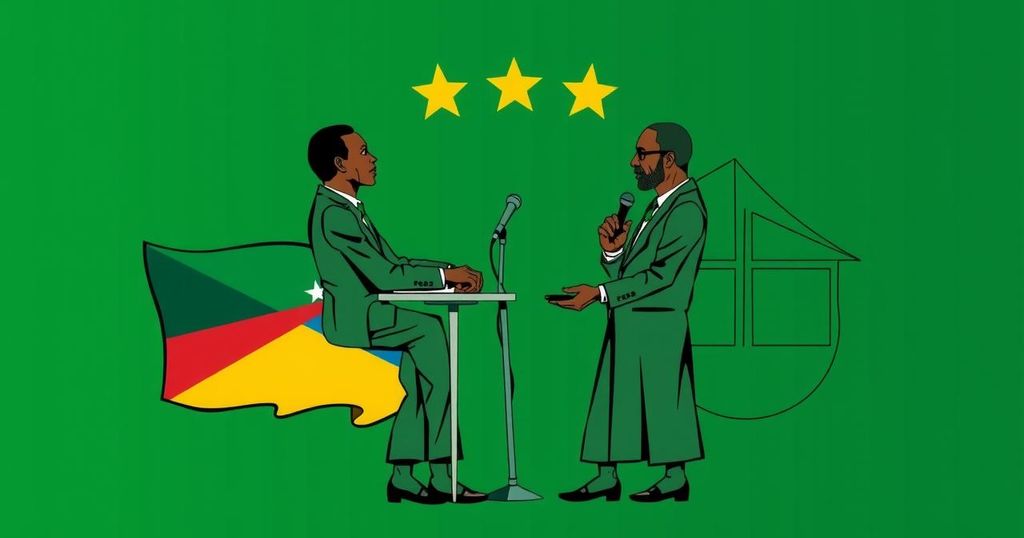Politics
AFRICA, CONGOLESE ARMY, CORRUPTION, DEMOCRACY, DEMOCRATIC REPUBLIC OF THE CONGO, DRC, ELIAS MAGOSI, EMMERSON MNANGAGWA, FORQUILHA, FR, HUMAN RIGHTS, MAGOSI, MAPUTO, MOZAMBICA, MOZAMBIQUE, OF MOZAMBIQUE, OPTIMIST PARTY FOR THE DEVELOPMENT OF MOZAMBIQUE, PODEMOS, REGIONAL COOPERATION, REPUBLIC OF MOZAMBIQUE, SOUTHERN AFRICAN DEVELOPMENT COMMUNITY, VENANCIO MONDLANE, ZIMBABWE
Fatima Khan
0 Comments
SADC Summit Addresses Unrest Following Mozambique’s Controversial Elections
The SADC summit in Zimbabwe addressed Mozambique’s violence post-elections, amid allegations of police brutality and electoral fraud by the FRELIMO government. The meeting affirmed SADC’s support for peace and stability while urging citizens to pursue legal remedies instead of violent protests. Political tensions persist as opposition parties contest the election results, and President Nyusi calls for dialogue.
The Southern African Development Community (SADC) convened an extraordinary summit in Zimbabwe to address the ongoing violence in Mozambique following its recent elections. The unrest, which erupted after the elections, has been marked by allegations of police brutality, with civil organizations reporting the deaths of at least 30 individuals. The opposition party, FRELIMO, represented by President Filipe Nyusi, has been accused of electoral fraud in the October 9 elections, leading to significant public discontent.
Elias Magosi, SADC’s executive secretary, stated that the summit received updates on Mozambique’s political and security climate and reaffirmed the community’s commitment to supporting peace and stability within the nation. He extended condolences for the lives lost amidst the unrest and urged affected parties to seek legal recourse rather than violence. However, during the closing remarks, Zimbabwean President Emmerson Mnangagwa focused solely on the conflict in the eastern Democratic Republic of the Congo, neglecting issues in Mozambique.
Albino Forquilha of the Optimist Party for the Development of Mozambique (PODEMOS) expressed skepticism over the significance of the SADC meeting, emphasizing that his party is mobilizing protests against the electoral commission’s announced results, which diverge from the actual polling data. He highlighted the importance of having representative dialogue with competing political parties in the constitutional court to secure transparency and trust in the election processes.
Furthermore, President Nyusi’s recent address inviting dialogue with all presidential candidates underscores the administration’s intent to pacify escalating tensions. However, opposition parties maintain that the legitimacy of FRELIMO’s victory remains contested, as they firmly oppose the claim that candidate Daniel Chapo won the presidency.
The situation in Mozambique presents a complex challenge for the SADC as it navigates the intertwined layers of political unrest, demands for fair electoral processes, and regional stability.
The political landscape in Mozambique has experienced heightened volatility following the accusations of electoral fraud during the recent presidential elections held on October 9. The ruling party, FRELIMO, which has maintained power since the end of the civil war in the 1990s, faces significant backlash from opposition groups and civil society, leading to violent protests and alleged state-sponsored repression. The SADC, an organization focused on fostering regional cooperation and stability, held a summit to discuss these issues alongside the conflict in the Democratic Republic of the Congo, further emphasizing the interconnectedness of political stability in Southern Africa.
In conclusion, the post-election violence in Mozambique poses a pressing challenge not only for national stability but for regional cooperation as well. As citizens demand transparency and justice in electoral processes, the SADC remains committed to facilitating dialogue and peace. The dialogue proposed by President Nyusi may hold potential for mitigating unrest; however, the credibility of FRELIMO’s electoral victory continues to be a point of contention for opposition parties. Addressing these grievances through legitimate political channels remains vital for restoring public trust and ensuring lasting stability in the region.
Original Source: www.voanews.com




Post Comment